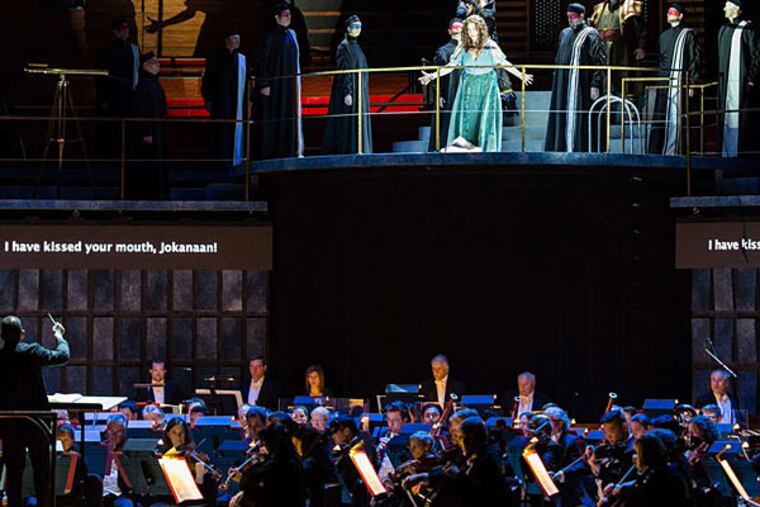Philly Orchestra's 'Salome' goes beyond restraint
When it's all that it can be, the 100-minute musical volcano known as Richard Strauss' Salome goes to a place of barely contained frenzy in its story of a princess who desires John the Baptist right down to his severed head. The Philadelphia Orchestra's season-ending, mostly staged version Thursday went a step beyond, often seeming without restraint.

When it's all that it can be, the 100-minute musical volcano known as Richard Strauss' Salome goes to a place of barely contained frenzy in its story of a princess who desires John the Baptist right down to his severed head. The Philadelphia Orchestra's season-ending, mostly staged version Thursday went a step beyond, often seeming without restraint.
That usual space between the music and its listener often vanished - as with Herbert von Karajan's live performances and, more recently, those of Gustavo Dudamel and Yannick Nézet-Séguin on good days.
Under Nézet-Séguin, the Philadelphia Orchestra, indeed, morphed into that ferocious, glittering beast conjured by Strauss' ever-combusting score, in ways that eclipsed any Salome I've heard in the Germanic opera capitals of the world (Vienna, Salzburg) - at least in orchestral terms.
Such qualities, though, sometimes came at the expense of the singers.
The cast, with the excellent Camilla Nylund in the title role, was nearly as fine as any that can be currently assembled. But the orchestra covered them increasingly as the opera went on, partly due to the manner of presentation.
Although staged with much thought and skill by director Kevin Newbury, singers weren't positioned in front of the orchestra (as happens with opera in concert) but rather in Verizon Hall's Conductor's Circle, in the rear of the orchestra, where there was room for scenic elements. Also, singers and conductor could face each other, as they would in the opera house. But this was an acoustical disadvantage.
Vita Tzykun's costumes suggested symbolic figures from tarot cards - designs that had poetic implications themselves, but also kept the singers under wraps, so that one had to look hard to see their faces and guess at their body language. Lighting left singers in the dark during surprisingly significant moments. Surtitles didn't always work.
But the important stuff - the guts of the opera - was there, more than in the Vienna Philharmonic's recent Salome at Carnegie Hall. And then some: Newbury's staging explored the intersection of sexual and religious fervor in ways I've never seen.
Although fitfully choreographed by Sean Curren, Nylund's Dance of the Seven Veils was operatically credible (OK, so it wouldn't cut it in Hollywood), while her soprano has the size and beauty of tone for Salome. In such a language-heavy opera, however, one struggled to hear how she was using that language amid imposing orchestral balances. Alan Held's bass-baritone was plenty imposing for John the Baptist, with tone that's unusually pure and devoid of bluster. As Herod, John MacMaster made his extended rants an advantage rather than a trial. Birgit Remmert (Herodias) seemed vocally out of sorts and costumed in a remote Victorian fashion.
Although Saturday's performance is said to be sold out, tickets are turning up - but recommended only for those who know what they're getting into. When Salome is this fully realized, it's disturbing in ways only great art can be.